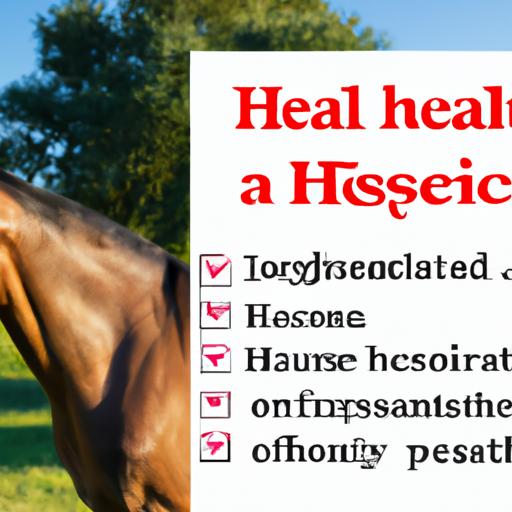Discover essential tips for maintaining horse health, including regular veterinary check-ups, proper nutrition and exercise, and biosecurity measures. Get your horse health certificate today!
Introduction

When it comes to the health and well-being of our equine companions, there’s no room for compromise. As responsible horse owners, ensuring the health and safety of our horses is of utmost importance. One essential aspect of this care is obtaining a horse health certificate. In this article, we’ll explore the significance of horse health certificates and provide an overview of the certification process.
Importance of Horse Health Certificates
As horse owners, we understand the vital role that horse health certificates play in safeguarding the overall well-being of our beloved animals. These certificates serve as official documentation of a horse’s health status and are often required for various purposes, including interstate and international transportation, sales, and competitions.
By obtaining a horse health certificate, you not only comply with legal requirements but also demonstrate your commitment to responsible horse ownership. This certification not only protects the health of your horse but also plays a crucial role in preventing the spread of diseases within the equine community.
Overview of Horse Health Certification Process
The process of obtaining a horse health certificate involves veterinary inspections and necessary testing to ensure your horse is healthy and free from contagious diseases. A certified veterinarian conducts a comprehensive examination, which may include assessing the horse’s overall health, evaluating vaccination records, and collecting samples for laboratory testing, if required.
During the certification process, veterinarians adhere to specific guidelines and regulations set forth by local authorities and organizations. These guidelines aim to maintain the highest standard of horse health and minimize the risk of disease transmission. Once the horse passes the examination and testing, the veterinarian issues the horse health certificate, providing evidence of your horse’s good health and eligibility for various activities.
As responsible horse owners, it’s essential to understand the significance of horse health certificates and the certification process. By obtaining these certificates, we contribute to the overall well-being of our horses and ensure safe transportation to different locations. In the following sections, we’ll delve deeper into the benefits of horse health certificates, the steps involved in obtaining them, and how they can be instrumental in maintaining equine health. Stay tuned to learn more about these important aspects of horse care.
Understanding Horse Health Certificates
Definition and Purpose
Horse health certificates serve as official documents that certify the health status of a horse at a specific point in time. These certificates provide crucial information about the horse’s overall health, vaccinations, and any recent tests undergone. The purpose of these certificates is to ensure the safety and well-being of horses during transportation, sales, and participation in various equine activities.
Horse health certificates act as a means of communication between horse owners, veterinarians, and regulatory authorities. They provide assurance to all parties involved that the horse meets the necessary health standards, reducing the risk of disease transmission and ensuring the welfare of the equine population.
Legal Requirements for Horse Health Certificates
Obtaining a horse health certificate is often a legal requirement for certain activities involving horses. The specific regulations and requirements may vary depending on the country, state, or region. It is essential for horse owners to familiarize themselves with the legal obligations governing the issuance of these certificates.
For example, when transporting a horse across state lines or internationally, many jurisdictions require a valid health certificate issued within a specified timeframe. These regulations are in place to prevent the spread of contagious diseases and maintain the health of the equine population.
In addition to transportation, horse health certificates may also be necessary for sales, competitions, and events. These requirements ensure that all horses participating in such activities are healthy and pose no risk to other animals.
Understanding the definition and purpose of horse health certificates, as well as the legal requirements associated with them, is crucial for every horse owner. By complying with these regulations, we not only protect our own horses but also contribute to the larger goal of maintaining a healthy equine community. In the next section, we’ll explore the numerous benefits that horse health certificates offer to horse owners and the equine industry as a whole.
Benefits of Horse Health Certificates
Ensuring the health and well-being of our horses is not only a moral responsibility but also crucial for the entire equine community. Horse health certificates play a significant role in achieving these goals by providing several benefits. Let’s explore some of the key advantages of obtaining horse health certificates.
A. Ensuring Equine Health and Well-being
Horse health certificates serve as a testament to the good health and well-being of our horses. By obtaining these certificates, we demonstrate our commitment to providing proper care and attention to our equine companions. Regular veterinary examinations and testing required for certification help identify any underlying health issues, allowing us to address them promptly. This proactive approach ensures that our horses receive the necessary treatment, vaccinations, and preventive measures to maintain optimal health.
B. Preventing the Spread of Diseases
The equine community is not immune to the risks posed by contagious diseases. Horse health certificates play a crucial role in preventing the spread of such diseases by ensuring that only healthy horses are allowed to participate in various activities, including competitions, sales, and transportation. By obtaining a horse health certificate, we contribute to the collective effort of maintaining a disease-free equine population. This not only protects our horses but also safeguards the health of other horses they come into contact with during events or transportation.
C. Facilitating Safe Horse Transportation
Whether you’re transporting your horse to a show, a new stable, or across state lines, ensuring their safety during the journey is paramount. Horse health certificates are often a legal requirement for interstate and international transportation. These certificates act as proof that your horse is healthy and fit for travel, providing peace of mind both for you and the transporters. With the certification in hand, you can be confident that your horse’s health is not compromised during transit, reducing the risk of exposure to stressors or infectious agents.
By understanding the benefits of horse health certificates, we can appreciate their significance in promoting equine health, preventing disease spread, and facilitating safe transportation. In the next section, we’ll delve deeper into the process of obtaining a horse health certificate, shedding light on the role of veterinarians and the necessary requirements. Stay tuned to learn more about this essential aspect of responsible horse ownership.
Obtaining a Horse Health Certificate
When it comes to obtaining a horse health certificate, several important factors come into play. Understanding the process and requirements is crucial to ensure a smooth certification experience for your equine companion. Let’s explore the key aspects involved in obtaining a horse health certificate.
Veterinarian’s Role in Issuing Certificates
The expertise and guidance of a certified veterinarian are paramount in the process of obtaining a horse health certificate. Veterinarians play a crucial role in assessing the overall health of your horse and ensuring compliance with the necessary regulations. It is essential to choose a qualified and experienced veterinarian who is knowledgeable about the specific requirements for issuing horse health certificates in your region.
During the certification process, the veterinarian will conduct a thorough examination of your horse. They will assess various aspects of your horse’s health, including physical condition, vaccination records, and any history of diseases or health issues. The veterinarian will also address any concerns or questions you may have, providing valuable advice on maintaining your horse’s health.
Examination and Testing Requirements
To obtain a horse health certificate, your horse will undergo a comprehensive examination. This examination may include a physical assessment, checking vital signs, and evaluating the horse’s overall health. The veterinarian may also conduct specific tests, depending on the requirements set by local authorities and organizations.
These tests may involve collecting blood samples for laboratory analysis, checking for specific diseases, or verifying the horse’s vaccination status. It is crucial to follow any specific testing requirements and ensure that your horse is up to date on vaccinations to increase the chances of obtaining a valid health certificate.
Documentation and Paperwork
Obtaining a horse health certificate involves gathering and providing the necessary documentation and paperwork. This may include your horse’s identification documents, such as registration papers, as well as vaccination records and any previous health certificates. It is important to keep these documents organized and readily accessible to streamline the certification process.
Your veterinarian will guide you through the required paperwork and assist you in completing the necessary forms accurately. They will ensure that all the information provided is correct and up to date, increasing the chances of a successful certification.
By understanding the veterinarian’s role, examination and testing requirements, as well as the necessary documentation and paperwork, you can be better prepared to obtain a horse health certificate. Working closely with your veterinarian and ensuring your horse’s health is in top condition will contribute to a smooth certification process. In the next section, we will explore some valuable tips for maintaining your horse’s health and well-being. Stay tuned to learn more!
Conclusion
In conclusion, horse health certificates are not just a legal requirement but a crucial aspect of responsible horse ownership. By obtaining these certificates, we prioritize the well-being of our equine companions and contribute to the overall health of the equine community.
Throughout this article, we have explored the importance of horse health certificates and the certification process. These certificates serve as official documentation of a horse’s health status and are necessary for interstate and international transportation, sales, and competitions. By complying with these requirements, we not only protect our horses but also prevent the spread of diseases.
To ensure the health and well-being of our horses, it’s essential to follow certain guidelines and practices. Regular veterinary check-ups and vaccinations are vital for maintaining optimal health. By working closely with a veterinarian, we can stay updated on necessary vaccinations and ensure our horses receive the care they need.
Proper nutrition and exercise are also key factors in maintaining horse health. A balanced diet and appropriate exercise regimen contribute to their overall well-being and help prevent common health issues. Consulting with equine nutritionists and trainers can provide valuable insights into meeting our horses’ specific dietary and exercise requirements.
Additionally, implementing biosecurity measures is crucial in preventing the transmission of diseases. Practices such as quarantine for new horses, regular disinfection of equipment and stables, and practicing good hygiene can significantly reduce the risk of disease outbreaks.
In conclusion, horse health certificates play a vital role in the equine industry, ensuring the well-being of our horses and the safety of transportation. By adhering to the certification process and implementing proper care practices, we can contribute to a healthier equine community. At Horsemasterypro.com, we are committed to promoting responsible horse ownership and providing resources to help you maintain your horse’s health. Remember, keeping your horse healthy is not just a responsibility but a rewarding journey of companionship and trust.


